
As chairman/CEO of the Jamestown S’Klallam Tribe, I must correct the record about the environmental viability and respectful use of fish farming in the Salish Sea.
Reading the Op-Ed published Aug. 23 by Carl Wassilie reminds me of Socrates, who said, “It is better to change an opinion than persist in a wrong one.” We are at a moment in human history when fact and science must shape our opinions on how we sustain humanity while fighting the climate crisis that threatens our very existence. Science tells us ocean farming of native fish is the most environmentally sustainable solution available to produce food for our world.
Wassilie claims unilateral tribal opposition to aquaculture in Washington waters, which is not true. Several Washington tribes are engaged in aquaculture and already growing fish in Washington waters. A handful of tribes operate net pens, raising native fish to healthy size, on the Columbia River, in Washington rivers and lakes and here in the Salish Sea, the inland marine waters of Washington and British Columbia.
The Jamestown S’Klallam Tribe prides itself on our achievements protecting and sustaining our environment and salmon habitat, and we firmly believe that native species fish farming is our 21st-century opportunity to continue providing for our community while respecting and protecting our Salish Sea.
We believe Seattle Times readers deserve facts about how aquaculture — the breeding, rearing and harvesting of fish, shellfish, algae and other organisms in all types of water environments — helps sustainably feed the planet and can provide living-wage jobs in economically struggling tribal and rural coastal areas.
Multiple peer-reviewed studies have shown the ecological safety of farming native fish. In 2022, NOAA released a biological opinion showing net-pen aquaculture has little to no negative impact on endangered species in Puget Sound. Prior to that comprehensive study, the Washington Supreme Court issued a rare unanimous 9-0 ruling that affirmed the Washington Department of Fish and Wildlife used proper science in determining it was ecologically safe to raise steelhead in net pens in our waters, rejecting many of the dubious claims Wassillie asserts.
Advancements in technology allow aquaculture to be practiced sustainably; computerized feeding systems have virtually eliminated feed waste. State-of-the-art farms utilize sophisticated sensors and high-resolution cameras to provide comprehensive environmental monitoring of oxygen, temperature, tidal currents, plankton and sedimentation. And despite claims to the contrary, fish farms act like floating reefs; areas once barren teem with abundant aquatic life.
Our tribe strongly believes we must look at the real threats endangering our native trout and salmon populations, and fish farms are not to blame. Northwest tribes struggle to sustain the ability to harvest wild fish for livelihood, sustenance and ceremony. Through the implementation of modern sustainable fish-farming practices, we can produce locally grown seafood, sustaining seafood jobs, feeding our families and upholding our tribal traditions, without further depleting wild stocks.
Among the biggest threats to wild salmon are rapidly rising temperatures from greenhouse gases fueling our climate crisis. Yet, we continue to import 85% of seafood consumed in the U.S., instead of sustainably raising fish here at home. Washington consumers cannot buy locally farmed fish, but can purchase fresh farmed steelhead flown over 4,500 miles from Norway; an unnecessary carbon footprint.
In addition, modern aquaculture is the most environmentally friendly method of producing protein, offering the lowest possible feed-conversion-ratio and energy consumption, producing far fewer greenhouse gas emissions than land-based protein agriculture.
By denying legitimate science, activists like Wassilie use emotional rhetoric to block sustainable solutions that could help feed the planet.
"fish" - Google News
August 31, 2023 at 05:22AM
https://ift.tt/jvIU5a3
Farming native fish in the Salish Sea can be done safely, responsibly - The Seattle Times
"fish" - Google News
https://ift.tt/5eSlZBf
https://ift.tt/6yUjudK
Bagikan Berita Ini














The opinions expressed in reader comments are those of the author only and do not reflect the opinions of The Seattle Times.